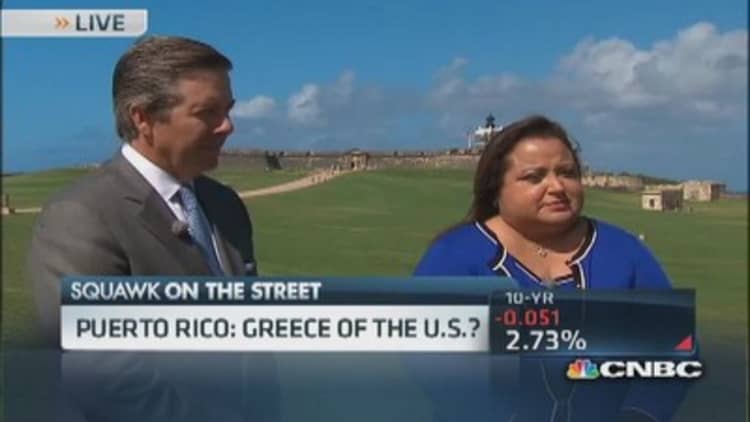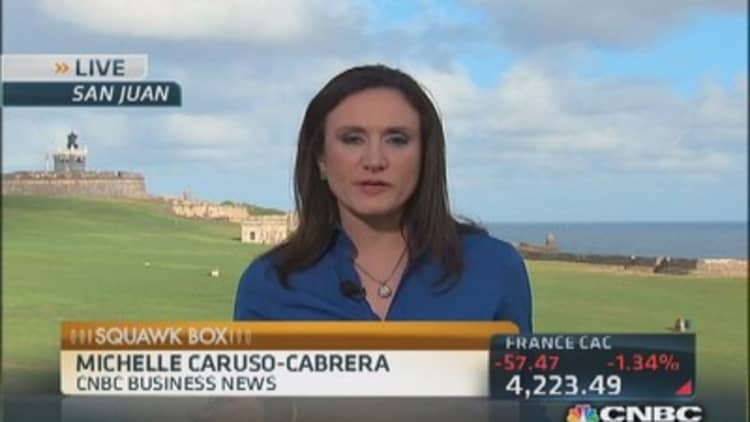
Puerto Rico is in an epic struggle to borrow money from the markets, and the clock is ticking.
The island, a territory of the United States, is in the midst of a debt crisis. With only 3.7 million people, it owes an eye-watering $70 billion in public debt, behind only New York and California. And much of that debt is widely held by American investors in municipal bond funds.
In theory, Puerto Rico should be borrowing less, not more. But ratings agency Moody's is concerned about a near-term liquidity shortfall—a lack of breathing room, so to speak, when it comes to covering what is budgeted to be an $820 million budget deficit this year.
(Read more: Puerto Rico approves measures to manage debt load)
On Dec. 23 Moody's wrote "An inability or unwillingness to access the market in January 2014 would be a negative rating factor." In other words, not borrowing money, or better said, not being able to, could lead them to downgrade Puerto Rico's debt, which would put the island at junk bond status.
The chairman of the Government Development Bank, David Chafey, told investors in October that liquidity in fiscal year 2014 would not be a problem, and that the island could get through the entire year without borrowing if it had to. Chafey and Puerto Rico Treasury Secretary Melba Acosta told CNBC that the island will go to market in the next month.
"We are preparing to go to market," Chafey told CNBC. "There are additional moves we took this week to demonstrate additional fiscal responsibility. Therefore, timing is some time in the month of February."
But Moody's isn't giving Puerto Rico that much time. The firm wants to see some of the expensive short-term debt refinanced into longer-term debt. Think of it like refinancing a 15-year mortgage into a 30-year mortgage; yes, the interest rate is higher, but the monthly payments are much lower, making it easier to manage cash flow.
But there's also a possible Catch-22: If the interest rate Puerto Rico has to pay is considered too high, that too could spark a downgrade.
(Read more: White House: No bailout for Puerto Rico)
A downgrade isn't just an issue of pride, it's an issue of money. Moody's estimates that if Puerto Rico does get downgraded to junk status, it faces $1 billion in additional short-term costs due to collateral calls on loans that are contingent on Puerto Rico not being rated junk.
Nearly 70 percent of U.S. municipal bond funds rated by Morningstar have some kind of exposure to Puerto Rico. That's because the island's bonds have what's known as "triple exemption." No matter what state you live in, if you own a Puerto Rico bond, you don't pay federal, state or local taxes on the interest.
In the meantime, the island is racing to make changes that will lead to long-term improvements in its fiscal picture. As in all debt crises, taxes and fees have gone up on nearly everything and everyone. Personal income taxes, corporate taxes, sales taxes, sin taxes, even taxes on insurance premiums have been hiked or newly imposed.

Water rates were hiked by 67 percent in order to improve the solvency of the water company. Government workers and teachers are facing cuts to their pensions. Teachers went on strike for two days and protested after the retirement age was raised from as low as 47 to at least 55 for current teachers, and 62 for new teachers.
Despite numbers that look incredibly frightening, there are bulls on Puerto Rican debt. Well-known investor James Grant told investors in his newsletter in October and again in early January that he is bullish on certain Puerto Rico bonds, but only for investors who can stomach the risk.
"The question before the house is whether qualified investors ... are being properly compensated for the anxious days and sleepless nights that may lie ahead. 'Yes,' we continue to believe," he wrote on Jan. 10.
(Read more: )
Just because an investor is bullish on the debt doesn't mean they don't think there will be a restructuring of some kind. Jonathan Carmel, of Carmel Asset Management, said that some bonds are selling at 60 cents on the dollar and he thinks, in the event of a restructuring, they are worth 80 cents.
It's worth noting that the menu of Puerto Rican bonds is hugely varied, and not all have the same level of risk. Hedge funds and municipal bond funds are picking and choosing those that they think are most likely to get paid back.
"Cofina" bonds, which are backed by a dedicated sales tax, are frequently recommended. Back in April, Barclays told investors Cofina bonds were undervalued and provided "high income for the rating level with an outsize potential for price appreciation."
Hedge fund manager Kyle Bass told CNBC last year that he thinks there is a write-down of 90 percent on some bonds in Puerto Rico.
—By CNBC's Michelle Caruso-Cabrera. Follow her on Twitter @MCaruso_Cabrera.


